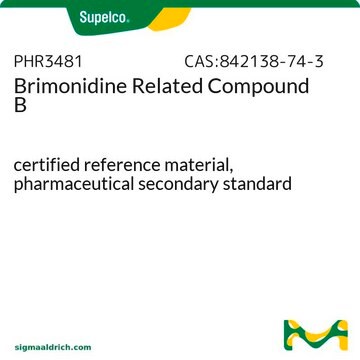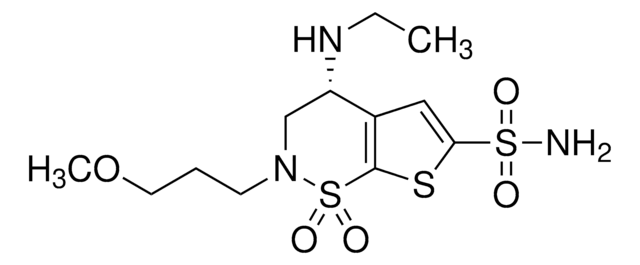Y0001658
Brimonidine tartrate
European Pharmacopoeia (EP) Reference Standard
About This Item
Recommended Products
grade
pharmaceutical primary standard
API family
brimonidine
manufacturer/tradename
EDQM
application(s)
pharmaceutical (small molecule)
format
neat
storage temp.
2-8°C
SMILES string
Brc1c2nccnc2ccc1NC3=NCCN3.O[C@H]([C@@H](O)C(=O)O)C(=O)O
InChI
1S/C11H10BrN5.C4H6O6/c12-9-7(17-11-15-5-6-16-11)1-2-8-10(9)14-4-3-13-8;5-1(3(7)8)2(6)4(9)10/h1-4H,5-6H2,(H2,15,16,17);1-2,5-6H,(H,7,8)(H,9,10)/t;1-,2-/m.1/s1
InChI key
QZHBYNSSDLTCRG-LREBCSMRSA-N
Looking for similar products? Visit Product Comparison Guide
General description
Application
Packaging
Other Notes
related product
Signal Word
Danger
Hazard Statements
Precautionary Statements
Hazard Classifications
Acute Tox. 3 Oral - Eye Irrit. 2 - Skin Irrit. 2 - STOT SE 3
Target Organs
Respiratory system
Storage Class Code
6.1C - Combustible acute toxic Cat.3 / toxic compounds or compounds which causing chronic effects
WGK
WGK 3
Flash Point(F)
Not applicable
Flash Point(C)
Not applicable
Choose from one of the most recent versions:
Certificates of Analysis (COA)
It looks like we've run into a problem, but you can still download Certificates of Analysis from our Documents section.
If you need assistance, please contact Customer Support.
Already Own This Product?
Find documentation for the products that you have recently purchased in the Document Library.
Our team of scientists has experience in all areas of research including Life Science, Material Science, Chemical Synthesis, Chromatography, Analytical and many others.
Contact Technical Service






